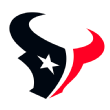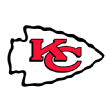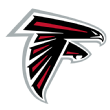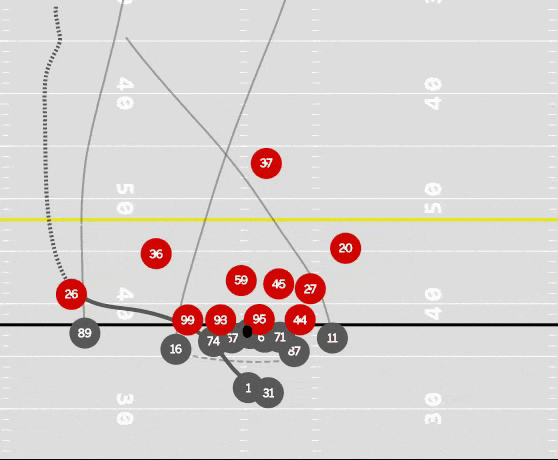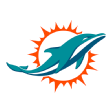Barnwell: Answering nine questions that could define the NFL season

There's very little settled in the NFL through six weeks. The Patriots are very good, the Dolphins are awful and just about everything in the middle seems to be up for grabs.
We've seen teams like the Chiefs, Cowboys and Rams go on losing streaks, while the Panthers and Saints lost their starting quarterbacks and went on winning streaks anyway. We're supposed to know more about what's going on in the league now.
With that in mind, I'm going to go through some of the more significant questions around the NFL and try to answer them. I'll hit on everything from a couple of coaches on the hot seat to a brewing quarterback controversy. Let's start with the biggest upset of the week:
Jump to a team:
ATL | CAR | DAL
HOU | KC | LAR
MIA | MIN | PHI
Is Deshaun Watson an MVP candidate?
Yes. I'm tempted to leave things there, but Watson has been incredible over the last two weeks in leading the Texans to victories over the Falcons and Chiefs. He has thrown for 706 yards and six touchdowns, run for 89 yards, six first downs and two more scores, and posted a Total QBR of 91.7. Watson threw two interceptions in Sunday's win over the Chiefs, but one was the product of his receivers running into the same area of the field. The other came after DeAndre Hopkins uncharacteristically dropped a would-be completion in the red zone.
The scary thing, I suppose, is that Watson could have even better numbers if he hadn't been let down by drops from Hopkins and Will Fuller on Sunday. He's playing absolutely lights-out football, and he was much better Sunday than his raw numbers and 77.5 passer rating indicated. While the Chiefs and Falcons clearly influenced things, one key number for Watson over the last two games has to be the zero sacks he has taken. He had porous offensive lines for his first two seasons in Houston, but he also deserved some of the blame for taking sacks as he extended plays. The line between extending plays and taking bad sacks is narrow, and over these two wins, he has toed it perfectly.
While the long-term effects of trading so many draft picks might be deleterious, the Texans are clearly a better offense after adding Laremy Tunsil to the fold. Tunsil hasn't been the best left tackle in the league, but he has been a mammoth upgrade on what Matt Kalil would have likely done on Watson's blindside. Tunsil also freed up would-be Kalil replacement Tytus Howard to start his career on the right side, and the first-round pick was playing well before being carted off with a knee injury against the Chiefs. Zach Fulton also ranks among the league leaders in ESPN's pass block win rateover the last two weeks.
If anything, Watson needs more help from his receivers. Hopkins, who hasn't scored in five weeks, has officially been credited by ESPN Stats & Information with two drops and has had a handful of other passes this year bounce off his hands. Fuller is tied for the league lead in drops with Julian Edelman at four. Kenny Stills has missed the last two games with a hamstring injury. Texans receivers have dropped five of Watson's passes over the last two weeks.
A win over the Colts next week would put the Texans in great shape to claim the AFC South title. They would move to 5-2 and sit comfortably ahead of the 3-3 Colts, with both the Jaguars and Titans remaining under .500. A quarterback typically needs to come away with a first-round bye and rank among the league leaders in fantasy points to garner serious MVP consideration. With the Chiefs struggling, the Texans -- who now hold a tiebreaker over their AFC rivals -- suddenly have a 43.5% chance of taking off Week 18.
What happened to the Cowboys offense?
Watson is third on my MVP ballot behind Patrick Mahomes and Russell Wilson. Dak Prescott was once between those two, but he's moving out of contention after a pair of subpar starts. The much-ballyhooed Cowboys offense is a mess; after scoring 97 points over the first three games of the season, Dallas has scored a total of just 56 in losses to the Saints, Packers and Jets. Just three weeks after starting 3-0, Jerry Jones is already having to defend coach Jason Garrett.
The simplest story is that the Cowboys faced pushovers the first three weeks of the season before moving up against tougher competition. The schedule certainly got tougher, but it doesn't explain the entirety of what the Cowboys did when starting 3-0. When you look at what the Giants, Dolphins and Washington have allowed opposing offenses to score in their non-Cowboys games to start this season, we would have expected the Cowboys to rack up 80 points over the first three weeks of the season. The Cowboys topped that by more than 21%.
Prescott was playing unconscious football through three weeks, but that has faded. Even given the relatively easy slate of defenses, he was significantly outperforming expectations. From Weeks 1-3, the NFL Next Gen Stats model projected Prescott would complete 64.6% of his pass attempts given where his receivers and defenders were at the time of his throws. Instead, Prescott hit on 74.5% of those passes, with the resulting 9.9% difference representing the largest gap in the league through three games.
While Prescott has continued to outperform these expected completion rates, it hasn't been quite as noticeable. His expected completion rate over the last three games has been just 60.3%, with Prescott hitting 65.8% of his throws for a 5.5% difference. He has thrown four picks over that span, although one was on a Hail Mary and another was off Amari Cooper's hands. Prescott's receivers have dropped 6% of his passes over that last three games, fourth most in the NFL.
The old canard about how Prescott's numbers fell off when Ezekiel Elliott left the field were always overstated, given how Elliott's six-game absence in 2017 was directly in line with an injury suffered by Tyron Smith and how the Cowboys only kick-started their passing game after trading for Cooper last year. On Sunday, we got to see whether Elliott could single-handedly jump-start the offense, given that Smith and fellow tackle La'el Collins were out injured and Cooper followed them to the sideline after three snaps with a quad injury.
It didn't quite work. Elliott ran for 105 yards, but it took the star back 28 carries to get there. Just 13 of his carries improved Dallas' expected points after the handoff, and Elliott failed to convert a key third-and-1, which then led Prescott to fail on the ensuing fourth-down try. Dallas' leading receiver without Cooper on Sunday was Tavon Austin, which should be telling in itself. I'm not sure we need to power rank the various Cowboys and their importance to the success of the offense, but it might be reasonable to put Cooper, Prescott and Smith all ahead of Elliott, who ranks 19th in yards per carry and 14th in first-down rate among running backs this season.
Some of the decline is old-fashioned regression to the mean, although the Cowboys have gone past the league average in cases. Through the first three weeks of the year, the Cowboys converted a league-high 58.1% of their third downs and converted nine of their 11 red zone trips into touchdowns, which was the fourth-highest rate in the NFL. Over the last three games, those same Cowboys have four touchdowns, three field goals and two stuffs on nine red zone possessions, with their 44.4% touchdown rate coming in at 23rd. Prescott & Co. are 16-of-36 on third downs, which is also coincidentally 44.4%; that's the 10th-best third-down conversion rate in the league. Good, certainly, but not the best offense in football.
It was also unrealistic to fall in love with offensive coordinator Kellen Moore after three games. The former Boise State star certainly seems to be an upgrade on Scott Linehan, and Prescott's level of play is certainly higher than it had been under Linehan in the pre-Cooper days. At the same time, when you watched what was working for the Cowboys during their hot start, it looked more like a product of great work by Prescott and bad defense than the shifting Moore had implemented before the snap. I don't think Moore has suddenly become a disaster, of course, but the Cowboys still ran a pitch to Elliott on third-and-11 against the Jets. Some of the short-yardage playcalls that didn't work looked unimaginative at first glance. The honeymoon phase for Moore and Cowboys fans is ending.
All this leads back to Garrett. This is the first time there has been serious unrest about the Cowboys firing Garrett since last year's loss to the Titans, which was supposed to seal Garrett's fate after a 3-5 start. The Cowboys have gone 10-4 and won a playoff game since. I don't believe they would suddenly fire Garrett in his 10th season because he has lost three games in a row. Jones also wouldn't fire Garrett unless he had a prestigious replacement lined up, and it's easier to line up those options in December and January than it is in the middle of October. Garrett is in the final year of his deal, but if the Cowboys want to part ways, I suspect it will wait until the end of the season.
The good news for the Cowboys is that the NFC East remains eminently mediocre. The Eagles fell to 3-3 with Sunday's loss to the Vikings and have to travel to Dallas in Week 7. The Giants are one game back at 2-4, and Washington is even theoretically in the race at 1-5, but the Cowboys have already banked a divisional win over each. The ESPN Football Power Index (FPI) still gives the Cowboys a 47.3% chance of winning the East.
Should the Chiefs sit Patrick Mahomes for a week?
For the second week in a row, Mahomes aggravated the ankle injury he originally suffered in Kansas City's season-opening win over Jacksonville. For the second week in a row, he wasn't anywhere near as effective after taking a hit to the ankle. And for the second week in a row, the Chiefs lost at home to AFC South competition, this time falling to the Texans 31-24.
In a game in which the Texans scored 31 points, the Chiefs didn't exclusively lose because Mahomes got injured. Kansas City's run defense remains an absolute disaster, and the Chiefs' pass rush failed to sack Watson once across 42 dropbacks. After throwing for 116 yards -- not a typo -- and a touchdown on the opening drive of the game, though, Mahomes wasn't effective after a second-quarter hit by Benardrick McKinney.
I went through the Jaguars, Colts and Texans games and charted Mahomes' performance before and after he injured his ankle. (There were two moments when Mahomes seemed to aggravate the ankle in the Colts game; I used the first as my cutoff point.) The numbers can't really be much clearer. In those three games, he has gone from before the ankle flare-up playing like the greatest quarterback who ever lived to looking more like, well, Andy Dalton:
There is a report that has suggested Mahomes might be suffering from a high-ankle sprain, which can sideline running backs for weeks but doesn't always keep quarterbacks out of games. Peyton Manning, for one, was able to play through a high ankle sprain during his MVP season in 2013. You don't need me to tell you how different Manning is from Mahomes, of course, and we've repeatedly seen Mahomes sail throws and struggle with his deep accuracy after he injures the ankle. With limited mobility, Mahomes is still a valuable quarterback, but he loses at least some portion of his magic.
The way to heal an ankle injury is with rest. It would be great if the Chiefs had a bye, of course, but Kansas City's bye doesn't come until Week 12, meaning he is set to play through this injury for five more games. He's also facing a short week in advance of a trip to Denver for a Thursday night game against the Broncos, who have won two straight after a heartbreaking 0-4 start to the season.
Obviously, the Chiefs don't want to go to backup Matt Moore unless absolutely necessary. Mahomes has also been great before aggravating the ankle injury, and he played like a star between Weeks 2 and 4. Given what has happened over the last two weeks, though, wouldn't this be a logical time to consider sitting him for a game in the hopes of getting him right for subsequent starts against the Packers and Vikings?
Ideally, the Chiefs would want a home game against the Dolphins, for instance, if they were going to sit their quarterback. That's not happening, but given their upcoming schedule, this road game against the Broncos would be the best time to manufacture some downtime for Mahomes in advance of the bye. The Chiefs are 3.5-point favorites at Denver, and while they would certainly become underdogs if Moore got the start, it would still be a winnable contest. An extra week of rest might not heal Mahomes' ankle, but avoiding the short week and getting what amounts to a bye would give the Chiefs the best chance of having their starter healthy for the remainder of the season.
Do I think the Chiefs will sit Mahomes? No. I could certainly see them resting him in the second half if they have a big lead or trail by a significant margin in any of their pre-bye games. If Mahomes is still ailing in Week 11 and the Chiefs have a comfortable divisional lead, they could theoretically rest Mahomes against the Chargers and give him a two-week breather in advance of the final five games of the season. For now, though, the Chiefs will likely continue to run him out there and simply hope their star doesn't injure the ankle any further.
Which contender has the most pressing need to address in the trade market?
The Eagles have to do something about their cornerbacks. On Sunday against the Vikings, they simply weren't competitive on the outside against Stefon Diggs and Adam Thielen with Rasul Douglas and Sidney Jones as starting cornerbacks. Thielen only managed 57 yards and a lone touchdown, but that was because Kirk Cousins sailed a throw that should have set up a second score. Diggs, meanwhile, went off for 167 yards and three scores.
Diggs'62-yard touchdown came against what looked like Quarters coverage, or Cover-4, on Douglas' side of the field. The Eagles dropped Douglas to the sticks and asked him to run with Diggs, which was a non-starter. Cousins threw the ball before Diggs was even past Douglas. The same couldn't be said about the second touchdown, where Cousins actually had two different wide-open receivers; with Douglas isolated on the backside of the formation after a play-fake against Diggs, the star receiver was already more than 3 yards past the overmatched cornerback by the time Cousins hit him for a 51-yard score.
Since general manager Howie Roseman regained control of personnel in Philadelphia, the Eagles havegenerally eschewed spending at cornerback in favor of investing along the line of scrimmage. Philly continued that philosophy this offseason, as the only notable moves it made in the secondary were to re-sign Ronald Darby to a one-year deal and to addAndrew Sendejo on a one-year deal for close to the minimum. With coordinator Jim Schwartz traditionally preferring to rush four and avoid blitzes, stacking the league's deepest front four made a lot of sense.
Six weeks in, though, that plan has failed. Defensive linemanMalik Jackson went down for the season in Week 1, and star interior rusher Fletcher Cox has had a disappointing start to the season, with zero sacks and three quarterback knockdowns in six games. Philly is blitzing 23.5% of the time, which is close to the league average of 26.3%. The Eagles are getting pressure, as they rank sixth in the NFL in pressure rate, but teams are picking apart Schwartz's defense when the rush doesn't get home.
The Eagles are allowing a passer rating of 107.5 when they don't pressure the opposing quarterback, which is 22nd in the league. Teams have thrown a league-high 60 passes against them within two seconds of their quarterback getting the football, and those passes have generated a passer rating of 102.4, the seventh-worst rate in the league. They are 28th in passer rating against screens (117.7) and 27th in passer rating against play-action passes (120.8). When you slow down or render the Philly pass rush irrelevant, you can succeed.
I don't think Philadelphia can get by with what it has in the secondary. It is already committed to Sendejo, Rodney McLeodand Malcolm Jenkins at safety. Darby and Avonte Maddox missed the Vikings game, and Darby has missed 18 games over his two-plus seasons with the Eagles. Counting on him to stay healthy isn't a viable option. Cre'von LeBlanc is out with a foot injury. CornerbackJalen Mills, who hasn't played this season, could be in line to return from his own foot injury over the next few weeks, but he hasn't been a difference-maker. The Eagles could nominally be deep at the position if everyone was healthy and lived up to expectations, but that's not happening.
Roseman is arguably the most aggressive GM in the league when it comes to trades. Philly has also restructured a number of contracts and has nearly $27 million in cap space to work with if it wants to add a veteran to the roster. The Eagles' long-term flexibility isn't quite as clear, given that Carson Wentz's contract really doesn't kick in until next season. Darby, McLeod, Mills, Sendejo and fill-in Orlando Scandrick are all free agents after the year, so they could very well rebuild their secondary next offseason.
The big name on the market, of course, is star Jaguars cornerback Jalen Ramsey. No better source than Jaguars owner Shahid Khan said that Ramsey would play this week after the two had a "heart-to-heart" conversation, but Ramsey still didn't feel able to play through his back injury. The Eagles would likely need to give up something close to two first-round picks to acquire Ramsey, who would expect a contract extension as part of the deal. I wouldn't put anything past Roseman, but it's tough to make the financial logic work in these sorts of deals, even for a player as talented as Ramsey. The Eagles went all-in for Wentz, but that was to acquire a quarterback who would make a fraction of his real value over the next three years.
If Ramsey's price comes down, the Eagles could make sense, but the Jaguars don't seem inclined to deal their former first-round pick. Other interesting corners also seem off-limits. The Cardinals have refused offers for suspended star Patrick Peterson. The Saints have former Eagles standout Patrick Robinson buried on their depth chart but are unlikely to trade their former first-rounder to a possible playoff rival. I've suggested that the Eagles make a move for Steelers corner Artie Burns, but the little-used Burns was forced into the starting lineup for Sunday night's win over the Chargers with Steven Nelson injured.
Philadelphia might be stuck waiting until the trade deadline for teams who are currently vaguely in contention to lose faith. The Broncos have won two straight, but they're 2-4 and veteran Chris Harris Jr. is a free agent at the end of the season. The 2-4 Titans are a mess on offense and have Logan Ryan, who was one of the best corners in football through the first month of the season, entering the final year of his deal. The Giants probably wouldn't make an in-division trade with their rivals, but do they really need Janoris Jenkins if they're not competing for a playoff berth?
As is, it's tough to see the Eagles having enough at corner to win against the likes of the Vikings, Rams and Saints come January.
Should the Falcons fire Dan Quinn?
I am generally against in-season coach firings. Teams almost never hire a coach from outside the organization in midseason, so if they're firing a coach in the middle of the campaign, they're just promoting a coach from his staff. Chances are that coach isn't doing a great job, either, so promoting him isn't some genius idea. There's also a chance that the coach will see the team regress toward the mean, pick up a couple of victories and convince ownership that he deserves to shed the interim tag, which has typically been a decision NFL teams have regretted.
Quinn might be the exception to this rule. The Falcons defense is unwatchable. I covered Atlanta's defensive woes in my playoff fallers column last week, and Sunday's loss to the Cardinals wasn't much better. The Falcons allowed Kyler Murray to throw for 340 yards and three touchdowns and failed to come up with even a knockdown of a quarterback who had been sacked on 9.5% of his dropbacks before Sunday. It's one thing to fail because of a lack of talent, but the Falcons continue to blow coverages in incomprehensible ways:
David Johnson had a scarcely believable 14.2 yards of separation between him and any other defender when he caught this pass (animation courtesy of NFL Next Gen Stats). It's difficult to see many signs of progress from Quinn's defense as this season has gone along; if anything, it's getting worse.
Arthur Blank has been patient to a fault during his time as Falcons owner. It was clear that Mike Smith was going to be fired when the Falcons hit their bye week in 2014 at 2-6, but Blank let Smith coach the rest of the season out before moving on and hiring Quinn. Smith never made it to a Super Bowl, while Quinn did in his second year at the helm, and that might allow the former Seahawks defensive coordinator more leeway. It also might be harsh to fire Quinn after a game the Falcons lost, in part, because Matt Bryant missed an extra point thatwould have sent the contest to overtime.
At the same time, though, the Falcons could be better-positioned to make a move. They have a coordinator on staff with head-coaching experience in Dirk Koetter and a pair of former head coaches who could assume offensive coordinator duties in Raheem Morris and Mike Mularkey. Bob Sutton, the former Chiefs defensive coordinator, is on Quinn's staff as a senior assistant. I can understand if Falcons fans aren't excited by those names, but there are veterans who could move into larger roles if Blank decides that Quinn has had enough.
The Falcons have home games against the Rams and Seahawks over the next two weeks before their Week 9 bye. Their last home game, a 24-10 loss to the Titans, featured what would charitably be described as a sparse crowd. If the Falcons can't beat the NFC West opposition and fall to 1-7 in a half-empty new stadium, it's difficult to see Quinn coaching out the slate, no matter how generous Blank has been in the past.
Can the Vikings win a Super Bowl with Kirk Cousins?
Yes. In the big picture, plenty of quarterbacks who are at a similar level to Cousins have won a Super Bowl. Joe Flacco won a Super Bowl with the 2012 Ravens. Eli Manning won two Super Bowls. Trent Dilfer and Brad Johnson won Super Bowls. At the risk of sparking a quarterback debate about uninspiringly competent quarterbacks, Cousins certainly at least belongs in the discussion with those guys. An utterly compromised Peyton Manning was benched for Brock Osweiler in November 2015 and won a Super Bowl with the Broncos three months later. Manning failed to complete 60% of his passes and threw 17 interceptions against nine touchdowns. Cousins is better than that version of Peyton Manning.
It helps to remember that Cousins does have a higher ceiling than game manager, though. After being grilled for poor play during Minnesota's 16-6 loss to the Bears, Cousins has taken a lead role in victories over the Giants and Eagles. Dalvin Cook ran for 132 yards in the 28-10 victory over New York, but the stout Philly run defense held Cook to 41 yards on 16 carries. Alexander Mattison chipped in with a 35-yard run, but the Vikings needed a big game out of Cousins to keep up with the Eagles on Sunday.
Outside of a stray throw or two, he had that game. Cousins went 22-of-29 passing for 333 yards and four touchdowns with one pick, which came when a pass bounced off of Diggs' chest and into the hands of Sendejo. Cousins finished the game with a 91.4 Total QBR, which was his best single-game performance as a member of the Vikings and his best start since December 2016. The only quarterbacks with a better QBR over the past two games than Cousins are Watson and Russell Wilson, and nobody has averaged more than Cousins' 11.4 yards per attempt.
Asking Cousins to keep up this level of play over the rest of the season seems unlikely, but the schedule over the next month doesn't seem particularly onerous. Before Minnesota's Week 12 bye, Cousins gets the Lions on a short week, a revenge game against Washington, a road trip against the Chiefs, a trip to face the Cowboys and a home game against the Broncos. The only one of those teams that ranks in the top 10 in pass defense DVOA is Kansas City, which will likely fall out after Sunday's loss to the Texans.
Every discussion of Cousins' ability seems to revolve around his three-year, $84 million contract. For the Vikings in 2019, his contract doesn't matter. It's a sunk cost. The Vikings are either going to win or lose with him in the fold. They are going to be at odds with themselves, as a front office which committed significant long-term contracts to its quarterback, tight end and top two wide receivers battles with a coach who wants to run the ball at a 1970s rate. Those issues aren't going away.
To that end, the determining factor for the Vikings is still going to be their defense. Look at those quarterbacks I mentioned in the first paragraph. They each enjoyed excellent defensive work, both in the regular season and then for a sustained stretch in the playoffs. Flacco got hot and pieced together one of the best playoff stretches in NFL history, but these quarterbacks were generally good enough to be carried to a Super Bowl by a dominant defense. Minnesota's defense hasn't quite played at that level this season, but it is certainly good enough to get hot and piece together a three- or four-game stretch at that level if the Vikings make it into the postseason.
Yes, they are paying for more than "good enough to win with" as part of Cousins' free-agent deal, which expires after the 2020 season. It's clear that Cousins isn't going to carry them to a Super Bowl with weekly performances like what we saw on Sunday, but he's also good enough to take advantage if his defense goes supernova. If the defense doesn't dominate, Cousins isn't going to make up the difference, at least not for three games against the league's toughest teams in January and February.
Is the Rams offense broken?
Sunday's 20-7 loss to the 49ers wasn't the worst offensive game we've seen from the Rams under Sean McVay, but it was pretty close. You probably remember the beatdown the Bears put on McVay & Co. last December, when Vic Fangio's defense forced four Jared Goff interceptions and held L.A. to six points. If you were going to craft a nightmare scenario for Goff, it would be facing a dominant defense in a cold-weather city on the road in December, so that makes some sense.
Goff's Rams also scored just seven points in a midseason loss to the Vikings during the 2017 season, but that was a road game against a dominant team, albeit in a dome. We're quickly coming to realize that the 49ers have a legitimately great defense, and I'll have more to say about them and their defense on Thursday, but the Rams were coming off a long week and were at home against the Niners this weekend. The Vegas line implied that the Rams were expected to score 26.5 points as favorites against their divisional rivals.
Instead, we saw what happens when a coach and a struggling quarterback have no confidence in their pass protection. Goff went 13-of-24 for 78 yards on Sunday and produced just one passing first down on 28 dropbacks. The only other quarterback in the last five years to throw more than 20 pass attempts and produce one solitary first down is Peyton Manning in the aforementioned game where he was benched for Osweiler against the Chiefs in 2015. Goff finished the day with a Total QBR of just 3.2, his worst single-game mark as a pro. His final pass was an ugly miss on what should have been a walk-in touchdown for Gerald Everett.
To be fair to Goff, there was little he could do for most of this game. The 49ers simply overwhelmed him, pressuring him on 42.9% of his dropbacks. Some of those pressures came before Goff could realistically do much in terms of surveying this field. On this Solomon Thomas sack, for example, the former third overall pick nearly beats Goff to the end of his dropback.
Goff's first sack saw him trip over left guard Joe Noteboom, who suffered a knee injury on the play and did not return. Noteboom was replaced by Jamil Demby, who had an uneven game. He wasn't the only one along the line. Rob Havenstein allowed a strip sack. Brian Allen committed two penalties, as did stalwart left tackle Andrew Whitworth. Last season, Rams offensive linemen were responsible for 25 penalties and 168 penalty yards. Through just six games in 2019, the line has been flagged for 21 penalties and 148 penalty yards.
McVay's game plan to start the game, quite clearly, was to run the football. Even without Todd Gurley, the Rams ran the ball seven consecutive times on their game-opening drive, producing a total of 56 yards and a touchdown from Robert Woods. Just as purists were heartened by the Rams establishing the run, though, Los Angeles' subsequent 15 rush attempts generated just 53 yards and five first downs. Thirty-six of those yards came on consecutive runs from Darrell Henderson, who would later fumble away a pitch to the 49ers.
The failed run plays included consecutive stuffs of Malcom Brown at the 1-yard line on third and fourth down. Both plays were quick snaps out of a short backfield, with the clear implication that the Rams didn't trust their offensive line to hold up for long at the point of attack. McVay would later try to speed into a second-and-18 draw, which went for 1 yard and also included an illegal shift. The Rams went with two screens and a draw when Goff was in third-and-long early, only asking him to throw downfield on third-and-long when it was absolute necessary later in the game, and then with no success.
This game could have been a bigger blowout. Jimmy Garoppolo didn't play great, throwing an ugly interception and losing a strip sack. Marquise Goodwin dropped a likely touchdown. Robbie Gould missed a field goal. The 49ers were able to get away with losing an inadvertently touched muffed punt because of a second illegal shift from the Rams, but this wasn't like the Bucs game, where it felt like the Rams were perpetually about to come back. McVay's team was clearly second-best for the vast majority of this matchup.
Next week should be a shot in the arm for the offense, given that the Rams will face Quinn's lowly Falcons defense. McVay should be able to exploit one of the league's most undisciplined units. In the big picture, though, this offense isn't running like the Rams attack we know. The same Goff who had a passer rating of 112.3 on play-action from 2017-18 is all the way down at 73.2 after six weeks, placing him ahead of Luke Falk and the two Dolphins quarterbacks.
The Rams are now entrenched in third in the NFC West, stuck at 3-3 behind the 5-0 49ers and 5-1 Seahawks, both of whom have head-to-head victories over Los Angeles. If they don't dominate the Falcons, this could become a full-fledged crisis.
Are the Dolphins the worst team in NFL history?
I applaud Brian Flores' decision to go for two and try to come up with a victory over Washington on Sunday, but the failed screen pass the Dolphins ran might be the closest Miami comes to a victory all season. The Dolphins are now 0-5 and have been outscored by 138 points through five games. That's the worst mark since 1954. I think we can very comfortably say this is the worst team in modern league history, at least through five games.
There's not much of a reason to think things are about to get better. Washington at home was the most winnable game on Miami's schedule. The Dolphins have already played four of their eight home games. After sayingduring the week thatJosh Rosen would be the team's starting quarterback for the remainder of the season, Rosen's 2.1 Total QBR performance was so bad that Flores benched him for Ryan Fitzpatrick during the second half. The Dolphins have an 24.7% shot of finishing 0-16, according to FPI.
Should the Panthers keep Kyle Allen in the lineup, even after Cam Newton is healthy enough to play?
Quarterback wins and selective endpoints are one heck of a combination. In 2018, with Newton ailing and playing through pain, the Panthers lost the former league MVP's final six starts of the season. Newton then lost his first two starts in 2019 before again leaving the field with a Lisfranc injury. Allen, meanwhile, won a start against a Saints team with nothing to play for in Week 17 of 2018 before starting 4-0 with the Panthers this season. Allen is 6-0 and Newton is 0-8. Carolina has to keep Allen in the lineup, right?
This is a disingenuous way to judge quarterbacks, of course. Before that 0-6 end to the season, Newton started 2018 by going 6-2, completing 67.3% of his passes, and posting a passer rating of 100.8 with 15 touchdowns against four picks, and all of that behind a much worse offensive line than the one the Panthers have now. He was a Pro Bowl candidate before his shoulder really started to give him fits. There's a perception that Newton is never healthy, but he missed a total of four starts across the first seven seasons of his career before missing two in 2018 and the four so far this season.
The positive thing for Newton is that the two injuries weren't related. His shoulder reportedly looked good in camp before he suffered the foot injury in a preseason game; after that, while his shoulder looked fine, he sailed throws to open receivers and had the sort of inconsistent mechanics that come when you don't feel comfortable with your footwork. When Newton's foot heals, he should -- at least theoretically -- be back to his old self, and that's a very valuable player.
The Panthers have gone undefeated in Newton's absence, but it's not like they haven't felt an absence. For one, they've missed the threat of a healthy Cam in short-yardage. The Panthers are just 3-of-7 on third or fourth down with 2 yards or less to go since Allen took over, including stuffs against the Jaguars and Buccaneers.Christian McCaffreyconverted after a third-and-1 attempt failed, but the Panthers then passed up the chance to convert two later fourth-and-shorts. Ron Rivera's team was 36-of-51 last season.
Comparing passing statistics also ignores what Newton contributes as a runner, which remains significant. Allen has run the ball 12 times for 41 yards and a touchdown, which came against the Saints backups last season. Over his eight healthy starts in 2018, Newton ran the ball 73 times for 342 yards and four touchdowns.
Allen's numbers are better than Newton's since the start of 2018, but that includes the period in which Newton's shoulder was compromised. Allen's advantage is that he hasn't thrown an interception. Newton has thrown 13, but nine of those came during the stretch in which his shoulder was hurt. Over the first eight games of 2018, Newton threw four picks and fumbled four times. Allen has no picks and has gone 153 passes to start his career without an interception, but he has fumbled six times.
Avoiding those interceptions has helped Allen win games. He has also benefited from a friendly schedule. He got to play the Saints' backups last year. In his four starts to begin 2019, Allen was able to get matched up against another backup quarterback in Gardner Minshew, as well as a rookie still ironing out the kinks in Kyler Murray. The Carolina defense was also able to help keep the Panthers afloat despite three Allen strip sacks in Week 4 against the Texans, holding Watson & Co. to 10 points.
The logic, as I laid out on Twitter this week, seems simple. The Panthers are better with a healthy Allen than an injured Newton, and when we last saw him, Newton was injured. History simultaneously tells us that the Panthers are better off with a healthy Newton than a healthy Allen. It's unclear whether Newton will be healthy when he returns or for how long that might last, but remember that Allen left the Saints game last season in the fourth quarter with an injury, too.
As for the long term, while Newton is still just 30 years old, the Panthers have to start thinking about what life might be like without their talented starter. He has two years and $39.8 million left on the extension he signed before 2015. The Panthers can certainly move on from him after this season with minimal financial burden, as they would only owe $2 million in dead money. Allen will be a restricted free agent after the season. Carolina also used a third-round compensatory pick on Will Grier this offseason, and you would figure Grier enters into the equation at some point.
None of this matters while the Panthers keep winning games, though. There's no reason to rush Newton back while Allen continues to hold his own. After their post-London bye, the Panthers get a road trip to face the currently undefeated 49ers in San Francisco. The Panthers will have no need to rush Newton back from his foot injury with Allen playing well; when they feel like he is ready at 100%, they should make the switch back. Newton is realistically a better all-around quarterback than Allen and has a much higher ceiling.



